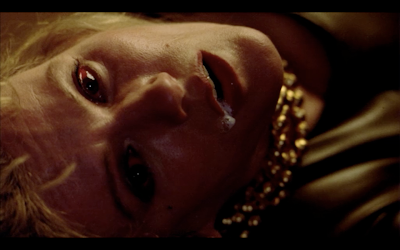Six Shooter, 2005, w./d. Martin McDonagh

Before there was
In Bruges, there was
Six Shooter. Before either, writer-director Martin McDonagh was already a celebrated
playwright, though I'm not familiar with his plays in print or performance, and evidently none of them have been adapted to film. It's easy though, with this knowledge, to draw a lineage from modernist theater to McDonagh's cinematic language. The opening of
In Bruges bears more than a passing resemblance to the beginning of Harold Pinter's
The Dumbwaiter, and his thematic concerns and black-as-pitch, frankly rather sick sense of humor echo a bit more distantly his countryman Samuel Beckett.
Reams could be written on the linguistic and conceptual density of
In Bruges (look for my book, coming on the fifteenth of never), but
Six Shooter deserves attention as well, on its own terms as well as a sort of prototype/dry run for McDonagh's approach to film storytelling. The title of the short, much like its feature-length successor, may be taken as a morally ambiguous object that weighs upon the plot — the revolver that is revealed in the final six minutes, one of a pair, is both an instigator and an escape route.
But we're getting ahead of ourselves.
Six Shooter opens on the apprehensive face of Mr. Donnelly (Brendan Gleason), as he is being told — by the camera, by us — that his wife has passed away in the wee hours of the morning. The utter absence of his wife as a character, save for a few implicit details about her love for a pet rabbit, stands out starkly. Donnelly is facing a loss, but we are facing a void. His experience hits home quickly, though, when he mutters to his wife's corpse, "I dunno what to say. I dunno where you are now." Donnelly can't contextualize the death, can't reassure himself as he is told later that she is "up with God." And so, in shock, he goes where McDonagh's characters go to forestall suicide — he gets on a train.

McDonagh is very interested in trains and restaurants and how they simulate privacy in public space. Think of the restaurant scene in
In Bruges — the Canadian diners, despite sitting in the smoking section, feel invaded and offended by Chloe's cigarette. When Ray encounters them again, he's in a train car, trying to look inconspicuous. Each time, he's essentially passive, but his assumption of privacy clashes with others' sense of privacy or control. In
Six Shooter, the train car offers a parallel arrangement of falsely private spaces similar to a restaurant.
Donnelly finds himself sitting across from a cordial sociopath, a sort of ur-Ray played by Rúaidhrí Conroy, who dare not keep a single crass thought to himself. He's particularly loudmouthed toward a couple sitting across and over from them — the weeping wife is being futilely comforted by the husband, and the kid heckles them constantly. A shower of "fucks" and "shites" sets the husband off: "If you use that language one more time, I'm gonna come over there and beat the shit out of you." To analyze the pleasures of that moment is to ruin a joke by explaining it, but here goes, in brief: what the husband is really upset about is not the foul language at all, but his own lack of control over his surroundings. We soon find out that he and his wife have lost their infant son, another bereaved party heading nondescriptly
away on a train.
What follows is a series of causally linked events, seemingly decorated with jokey banter from Conroy's character. But he goes on, relating an anecdote about "a cow with trapped wind" and the diminutive stranger who relieves its bloating at a cattle show, and the film switches focus to this grotesque tale. This is the only diversion from the otherwise linear progression of the plot, framed as a flashback but just as likely a flight of fancy. For McDonagh, jokes are never mere fancy or distraction, though — they're fundamentally rhetorical, a space for exploring the absolute depths of human possibility without consequence (but nothing is without consequence, for jokes can always offend or strike a nerve, which can equal an act of emotional violence).
As the short feature reaches its climax, racking up gruesomeness, it never stops being funny. This is the masterstroke of McDonagh's writing and filmmaking. He doesn't make dramedies, he makes comedies about grief. He experiments with the social spaces people occupy, and pits them against each other at their worst, to gauge the volume of these spaces.
Six Shooter does exactly what comedy ought to: it puts salt in the wound.






